
Did you know a bad tenant can cost landlords thousands? With more rental properties, tenant screening is key. It helps landlords make smart choices and follow the law.
In 2025, landlords have many screening options. We've looked at the best services for detailed reports and accurate results.
"The most effective tenant screening isn't just about risk mitigation—it's about intentional community building. When landlords shift their mindset from simply avoiding bad tenants to thoughtfully selecting good neighbors, the entire rental ecosystem benefits. A comprehensive screening process that balances credit history with contextual factors creates properties where tenants stay longer, care more deeply about their homes, and contribute positively to the community. This approach transforms screening from a defensive measure into a strategic investment in property value and tenant satisfaction, ultimately reducing turnover costs that far exceed the initial time investment in proper vetting."
Taylor Wilson, CEO of Rent with Clara

Proper tenant screening is key for landlords to lower risks and build a good rental community. It helps protect their property and money while making sure everyone lives safely and respectfully.
One big reason for tenant screening is to reduce financial risk. Checking a tenant's credit history shows if they can pay rent on time. A detailed credit report can show past money problems, like bankruptcies, which means they might not pay rent.
Also, checking a tenant's income and job shows they can afford rent. This helps landlords avoid expensive evictions and legal costs.
Good tenant screening is also important for protecting your property investment. Background checks and rental history reviews help find tenants who won't damage the property or break the lease.
A detailed screening helps pick tenants who will care for the property. This lowers the chance of expensive repairs or damage.
Thorough tenant screening also makes for a safer rental community. Criminal background checks help find people with a history of crime, which could be a danger to others.
Screening tenants fairly and consistently keeps the community safe. This is good for both the landlord and the tenants.
A tenant screening report is key for landlords to choose the right tenants. It helps them see if applicants are reliable and can pay rent on time. This reduces the chance of bad tenants.
To make a good tenant screening report, you need to look at a few important things. These help you understand if an applicant is a good fit for your rental.
Checking an applicant's credit history and credit score is very important. It shows if they can pay rent on time. A high score means they've paid bills on time before. A low score might mean they could have trouble paying rent.
For help understanding credit reports, landlords can look at SingleKey's Tenant Application Screening Guide. It has tips on how to use credit reports.
Looking at eviction records and rental history gives you insight into how they've been as tenants before. Eviction records show if they've had problems with landlords. Rental history shows if they've been good tenants.
Doing criminal background checks is also very important. It helps find out if an applicant has a criminal record. This keeps your property and other tenants safe.
Checking an applicant's income and employment status is key. It shows if they can afford the rent. You can look at pay stubs or call their employer to check.
By using these important parts in a tenant screening report, landlords can make better choices. This helps them avoid problems with tenants.
While an applicant's credit score provides a quick snapshot of creditworthiness, the full credit report tells the real story. Payment history accounts for roughly 35% of most credit scores, but you need to look beyond just the number.
A score of 650 with consistent on-time rent payments differs significantly from a 650 with multiple missed mortgage payments. Three major credit bureaus may report different information, so comprehensive reports that pull from multiple sources give you a clearer picture of tenant credit reliability.
Understanding the ability to pay rent goes beyond credit scores alone. Look at debt-to-income ratios, current obligations, and recent credit inquiries. A high credit score doesn't help if the applicant is already overextended with existing debts.
Conversely, someone with a lower score but stable income and minimal debt might be a better risk. Pay attention to the types of debts listed - medical collections often have less predictive value for rental payments than credit card defaults or previous evictions.
Recent credit activity can signal potential problems ahead. Multiple recent inquiries might indicate financial stress, while newly opened credit lines could affect the applicant's future ability to pay rent.
However, don't automatically disqualify applicants with imperfect credit - instead, use this information to set appropriate security deposits or require co-signers for higher-risk applicants.
Interpreting criminal and eviction data requires more nuance than simply looking for any past issues. Background reports often contain information that spans several years, and landlords must distinguish between minor infractions and serious red flags.
For instance, a single noise complaint from five years ago carries much less weight than recent property damage or violent crimes. Court records can reveal patterns of behavior, but it's crucial to consider the context and timing of any incidents.
The key to using comprehensive screening reports effectively is understanding what constitutes genuine risk versus past mistakes. A tenant background check might show an eviction from three years ago, but if it was due to job loss during economic hardship and the applicant has since maintained stable employment, this context matters.
Smart landlords focus on recent history and look for positive changes in behavior patterns.
Remember that you must comply with fair housing laws when reviewing background information. Some jurisdictions limit how far back you can consider criminal history, while others restrict the types of offenses you can use in housing decisions.
Always make informed decisions based on legitimate business reasons rather than blanket policies that could constitute discrimination.
Inconsistencies between different parts of the application often signal problems with your next tenant candidate. Pay attention when employment history doesn't align with income claims, or when references seem evasive about specific details.
Gaps in rental history deserve explanation - while legitimate reasons exist (living with family, home ownership, etc.), unexplained gaps might indicate evictions or other housing problems. Income verification documents that look altered or unprofessional should trigger additional scrutiny.
Eviction history isn't automatically disqualifying, but the circumstances matter significantly. Eviction reports from multiple landlords suggest a pattern, while a single eviction during a documented hardship might be forgivable.
Look for applicants who are upfront about past problems and can explain what's changed since then. Be wary of applicants who seem surprised by negative information in their eviction history - this either indicates poor record-keeping or potential dishonesty.
Communication red flags during the application process often predict future tenant problems. Applicants who are difficult to reach, argumentative about screening requirements, or pushy about bypassing standard procedures typically continue this behavior after moving in.
Trust your instincts when something feels off, but ensure your concerns are based on legitimate business factors rather than personal bias or discrimination.
Selecting a tenant screening service shouldn't be a one-size-fits-all decision. Independent landlords with just a few properties have different needs than those managing larger portfolios.
Some tenant screening services for landlords offer basic packages with standard credit checks, while others provide comprehensive solutions that integrate with a property management platform. Consider your volume of applications, technical comfort level, and specific screening requirements when evaluating options.
The best tenant screening solution often depends on the screening frequency and depth you require. If you're screening multiple applicants monthly, a subscription model with unlimited reports might save money compared to pay-per-use services.
However, landlords who screen infrequently might prefer services that charge per report. Look for providers that offer flexible screening packages - some include additional features like landlord reference checks and online application and screening tools that can streamline your entire process.
Don't overlook the importance of customer support and turnaround time. Many tenant screening companies promise quick results, but the reality can vary significantly.
Read reviews from other landlords and test the service with a trial run if possible. The cheapest option isn't always the best value if it means dealing with delayed reports or poor customer service when you need help interpreting results.
Finding the right tenant is key for independent landlords. A good tenant screening service can greatly reduce the risk of bad tenants.
Here are some top tenant screening services for independent landlords:
TransUnion SmartMove is a top pick for landlords. It offers detailed screening reports and is easy to use. It includes credit checks, eviction records, and rental history.
RentPrep is well-regarded for its detailed reports and great customer support. It checks credit history, eviction records, and criminal background.
MyRental makes tenant screening easy and fast. It includes credit reports, criminal background checks, and eviction records. It's a solid choice for landlords.
E-Renter provides detailed reports on potential tenants. It includes credit checks, background checks, and rental history. This helps landlords make smart choices.
Rent with Clara stands out as a modern, mobile-first tenant screening platform designed specifically for independent landlords. It offers comprehensive screening with advanced fraud prevention technology.
Rent with Clara is particularly well-suited for independent landlords managing 5-10 properties who want professional-grade screening without the complexity of traditional property management systems.
When picking a tenant screening service, look at pricing, report detail, and customer support. The right service helps protect your investment and makes renting smoother.
Tenant screening services have different prices. It's important to look at costs and features. The pricing models can affect the total cost for landlords or applicants.
There are two main pricing models: pay-per-screening and subscription-based. The pay-per-screening model lets landlords pay for each screening. This is good for those with fewer properties.
The subscription models charge a flat fee for a set number of screenings. This is better for landlords with many properties.
For example, TransUnion SmartMove uses the pay-per-screening model. RentPrep offers different plans, including subscriptions. Knowing these models helps landlords manage their costs.
Who pays for tenant screening can vary. Some landlords cover the cost, while others charge applicants. It's important to consider local laws and market practices.
When choosing tenant screening services, compare features to cost. A good service might include credit checks, eviction records, and criminal background checks.
By comparing features and cost, landlords can choose the best value for their needs.
It's key for landlords to know the legal rules for tenant screening. This helps avoid legal issues. Knowing the laws ensures fair and legal treatment of all applicants.
Fair housing laws stop discrimination in renting. Landlords must follow federal, state, and local laws. These laws protect against discrimination based on race, color, and more.
To follow the law, landlords should use the same criteria for all applicants. For more on legal use of tenant screening tools, check this resource.
If a landlord turns down an applicant, they must give an adverse action notice. This notice explains why they were denied. It also tells the applicant how to get a free copy of their credit report.
Landlords must protect applicant privacy and data. This means keeping sensitive info safe and disposing of it properly. They also need to make sure any third-party services follow data protection rules.
To protect your rental property, you need a good tenant screening process. It keeps your investment safe and makes your community better for everyone.
A fair and consistent application process is key. It means having a detailed form for all the important info. This includes rental history, job details, and references.
Key components of a standardized application include:
Having the same application for everyone helps landlords make fair choices. It reduces bias and makes the process more objective.
It's important to have clear rules for who can rent your property. This means setting minimum standards for applicants.
Examples of screening criteria include:
Being clear about these standards helps keep the process fair and consistent.
Talking clearly with applicants about the screening process is key. It helps manage their expectations and follows fair housing laws.
Experts say, "Being open about the screening process can lower the chance of problems. It also makes applicants happier."
"Being open about the tenant screening process builds trust. It shows you care about fairness and equality."
Landlords should explain the screening steps, what they look for, and when they'll decide. Being open helps build a better relationship with applicants and avoids legal trouble.

Once your comprehensive screening is complete, the real challenge begins: choosing between qualified applicants. Many landlords make the mistake of selecting the first prospective tenant who meets their minimum requirements, but taking time to compare candidates often yields better results.
Consider factors beyond just credit scores and income - look at rental history stability, communication responsiveness, and how promptly they submitted their rental application. These soft factors often predict long-term tenant satisfaction better than financial metrics alone.
Make informed decisions by creating a simple scoring system that weighs different factors according to your priorities. Some landlords prioritize income stability over perfect credit, while others focus on local references and rental history.
Document your decision-making criteria to ensure consistency and legal compliance across all applications. This systematic approach also helps when you need to explain your choice to unsuccessful applicants.
When you've selected your next tenant, move quickly to secure the lease. Good tenants often have multiple options, especially in competitive markets.
Prepare your lease documents in advance and be ready to schedule a signing within 48 hours of making your decision. Clear communication about next steps and timelines shows professionalism and helps ensure your chosen candidate doesn't accept another offer while waiting to hear from you.
Conclusion: Making Informed Tenant Selection Decisions
Using a detailed tenant screening service helps landlords make smart choices. It reduces the risk of bad tenants. This is key to protecting your property and making your rental area safer.
Top tenant screening services offer many features. These include checking credit history, eviction records, and criminal backgrounds. Choosing the right service makes finding good tenants easier and cuts down on costly evictions.
It's important to follow fair housing laws when screening tenants. Landlords should have clear criteria for screening. They should also tell applicants how the screening works.
Smart tenant selection leads to a better rental experience for everyone. Reliable tenant screening services are a big help in achieving this goal.